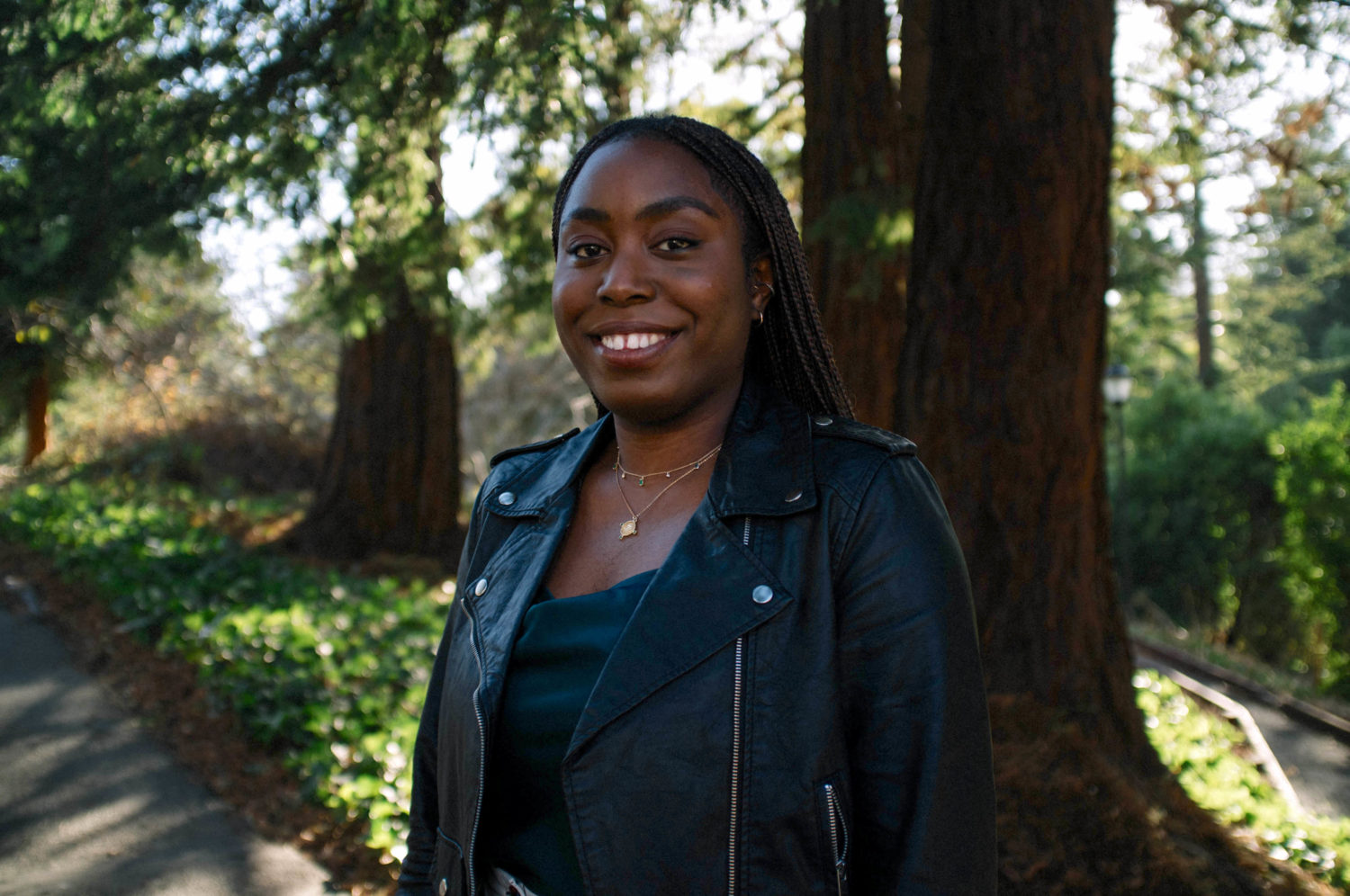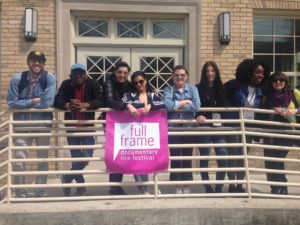
Ashley Omoma (‘20). Photo: Clara Mokri (‘21)
We all have heroes who have inspired our careers––but most of us aren’t lucky enough to win a fellowship in their name. Ashley Omoma, second-year filmmaking graduate student and this year’s Marlon T. Riggs Fellow, managed to do just that.
“It’s the best thing ever to be a black female filmmaker granted this award named after Marlon Riggs,” Omoma said. “To be influenced by him to come here, then to be given this amazing award named after him, is such a blessing.”
Commemorating the late Berkeley Journalism alumnus and professor Marlon T. Riggs (’81), the $10,000 fellowship was created in 2014 through the efforts of Vivian Kleiman, Riggs’ former collaborator. Funding was provided by Riggs’ Oakland-based production company Signifyin’ Works, the Ford Foundation, and The Filmmaker Fund. The fellowships are awarded annually by the School’s filmmaking faculty to a promising student of documentary.
Omoma, a self-described “born storyteller,” always knew she wanted to capture narratives. As an undergraduate at Lehigh University in Pennsylvania, she majored in journalism and Africana studies, and worked as a reporter and photographer for the school paper. She recalls falling for film while making a single short video for a photography class: “It was a horrible video, but I loved it,” she said.
Still, a career in filmmaking seemed far beyond her grasp.
“It never occurred to me that I could tell stories in a visual sense because I just didn’t grow up seeing people who looked like me telling stories in that way,” Omoma said.
Fortunately, Lehigh offered a Documentary Storymaking minor jointly with nearby Lafayette College and Muhlenberg College, an opportunity she says was “amazing.” There she found a community of emerging filmmakers and made friendships that have lasted to this day. “That program just opened my eyes,” she says. “The people I studied with were some of the most thoughtful, caring and forward-thinking people I’d ever met.”

Omoma and Documentary Storymaking class at the Full Frame Festival in Durham, North Carolina in 2018.
It was there she first discovered Riggs’ work through a recommendation of Iranian-American documentarist Aggie Ebrahimi Bazaz, a respected professor at the program.
“Marlon’s work spoke to me as the balance of journalism and art,” Omoma said. “It made me think that this was a medium that I could be in, giving room for exploration and discovery while still telling stories that are journalistically sound.”
For Omoma, graduate school has offered a chance to grow creatively, free from the pressures of a deeply competitive and often exclusive industry. And she attributes much of that growth to the support and “extraordinary patience” of her editor and instructor, Cassandra Hermann, herself an alum of the School.
“It’s not easy being in spaces where you haven’t been historically. And as a black woman, it can feel extremely isolating in an industry where the cost of entry is so high,” Omoma said. “So getting help from the few women who are in those spaces is so encouraging and so uplifting.”
For Herrman, the feeling is mutual. “Ashley is a thoughtful, bold filmmaker who is passionate about telling stories about communities of color, with a particular focus on stories about women,” she said.
Herrman also sees parallels between Omoma and the fellowship’s namesake.
“Ashley has talked about the powerful experience of feeling ‘recognized’ when she first saw one of Marlon’s films,” she said. “I am really excited to watch her as a filmmaker create those turning point moments for the next generation.”
Before returning to the School for her second and final year, Ashley worked as a producer for Refinery29 in New York City. Now, she’s hard at work on her thesis project, In Favor of Fetus, a film examining how certain laws can have outsized impacts on women’s pregnancies. `
“Ashley’s video and film work at the School has focused on stories about women of color, and examines how the criminal justice system and policies around gender and reproductive justice impact them,” said Ed Wasserman, Berkeley Journalism dean. “That is the kind of passion that Marlon Riggs would recognize and vigorously support, and it’s why Ashley is the ideal recipient of this award created in his honor.”
As Omoma looks forward in her career, she hopes to contribute to a growing body of minority voices pursuing undercovered stories, and to explore ever-more creative ways to tell them. Taken together, Omoma believes these voices will transform the industry.
“This is our turn to tell our stories that reflect us, that sound like us, that are told from our point of view,” she said. “It’s exciting to be a part of that next generation of filmmakers who tell the stories we want to tell.”
By Brett Simpson (‘21)
